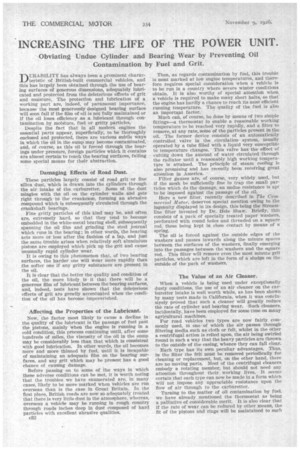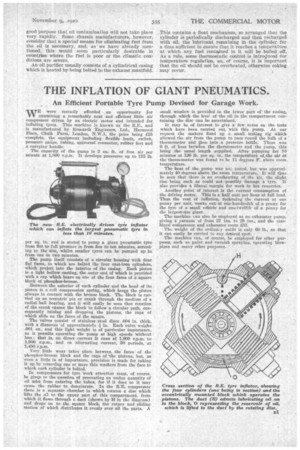INCREASING THE LIFE OF THE POWER UNIT.
Page 90

Page 91

If you've noticed an error in this article please click here to report it so we can fix it.
Obviating Undue Cylinder and Bearing Wear by Preventing Oil Contamination by Fuel and Grit.
DURABILITY has always been a prominent characteristic of British-built commercial vehicles, and this has largely been obtained through the use of bearing surfaces of generous dimensions, adequately lubricated and protected from the deleterious effects of grit and moisture. The protection and lubrication of a working part are, indeed, of paramount importance, because the most generously designed bearing surface will soon fail if the film of oil is not fully maintained or if the oil loses efficiency as a lubricant through contamination by moisture, fuel or gritty particles.
Despite the fact that in all modern engines the essential parts appear, superficially, to' be thoroughly enclosed and protected, there are various subtle ways in which the oil in the sump may become contaminated, and, of course, as this oil is forced through the bearings under pressure, foreign particles which it contains are almost certain to reach the bearing surfaces, failing some special means for their abstraction.
Datnaging Effects of Road Dust.
These particles largely consist of road grit or fine silica dust, which is drawn into the cylinders through the air intake of the carburetter. Some of the dust mingles with the oil on the cylinder walls and gets right through to the crankcase, forming an abrasive compound which is subsequently circulated through the crankshaft bearings.
Fine gritty particles of this kind may he, and often are, extremely hard, so that they tend to become embedded in the white-metal bearing shell, subsequently spanning the oil film and grinding the steel journal which runs in the bearing ; in other words, the bearing acts more or less after the fashion of a lap, and just the same trouble arises when relatively soft aluminium pistons are employed which pick up the grit and cause unusually rapid cylinder wear.
It is owing to this phenomenon that, of two bearing surfaces, the harder one will wear more rapidly than the softer one if any gritty substances are present in the oil.
It is clear that the better the quality and condition of the oil, the more likely is it that there will be a generous film of lubricant between the bearing surfaces, and, indeed, tests have shown that the deleterious effects of grit are greatly accentuated when the condition of the oil has become timpoverished.
Affecting the Properties of the Lubricant Now, the factor most likely to cause a decline. in the quality of the lubricant is the passage of fuel past the pistons, mainly when the engine is running in a cold condition, this process continuing until, after some hundreds of miles, the viscosity of the oil in the sump may be considerably less than that which is consistent with good lubrication. In other words, the oil becomes more and more thinned by fuel, until it is incapable of maintaining an adequate film on the bearing surfaces, and any grit which may be present has a good chance of causing damage.
Before passing on to some of the ways in which these adverse conditions can be met, it is worth noting that the troubles we have enumerated are, in many cases, likely to be more marked when Vehicles are run overseas than is the case in Great Britain. In the first place, British roads are now so adequately treated that there is very little dust in the atmosphere, whereas, overseas a vehicle may be running in rough country through roads inches deep in dust composed of hard particles with excellent abrasive qualities.
c32
-Then, as regards contamination by fuel, this trouble is most marked at low engine temperatures, and therefore requires special consideration when a vehicle is to be run in a country where severe winter conditions obtain. It is also worthy of special attention when, a vehicle is required to make many short halts, so that the engine has hardly a chance to reach its mOSt efficient running temperature. The quality of the fuel is also an important factor. Much can, of course, be done by means of two simple fittings—a thermostat to enable a reasonable working temperature to be reached very rapidly, and a filter to remove, at any rate, some of the particles present in the oil. The former device consists of an automatically controlled valve in the circulation system, usually operated by a tube filled with a liquid very susceptible to temperature changes, This valve has the effect of cutting down the amount of water circulated through the radiator until a reasonably high• working temperature is attained. The principle of steam cooling is also promising and has recently been receiving great attention in America.
Filter gauzes are, of course, very widely used, but if the mesh be sufficiently fine to trap the small particles which do the damage, an undue resistance is apt to be imposed against the passage of the oil.
Here a new filter, recently described in The Commercial Motor, deserves special mention owing to the ingenuity displayed in its design, this being the Streamline filter invented by Dr. Hele Shaw. Briefly, thin consists of a pack of specially treated paper washers, perforated with round holes and threaded on a square rod, these being kept in close contact by means of a spring.
The oil is forced against the outside edges of the washers and passes inwards along the minute spaces between the surfaces of the washers, finally emerging into the passages between the washers and the square rod. This filter will remove even the most minute grit particles, which are left in the form of a sludge on the outside of the pack of washers.
The Value of an Air Cleaner.
When a vehicle is being used under exceptionally dusty conditions, the use of an air cleaner on the earburetter intake is well worth while, as has been shown by many tests made in California, when it was conclusively proved that such a cleaner will greatly reduce the rate of cylinder and bearing wear. Such cleaners, incidentally, have been employed for some time on many agricultural machines.
For road vehicles two types are now fairly commonly used, in one • of which the air passes through' filtering media such as cloth or felt, whilst in the other a centrifugal action is relied upon, the air being swirled round in such a way that the heavy particles are thrown to the outside of the casing, whence they can fall clear.
Each type has its own peculiar advantages. Thus, in the filter the felt must be removed periodically for cleaning or replacement, but on the other hand, there are no moving parts. Most of the centrifugal cleaners embody a rotating member, but should not need any attention throughout their working lives. It seems certain that each type can now be made in a form which will not impose any appreciable resistance upon the flow of air through to the carburetter.
Turning to the matter of oil contamination by fuel, we have already mentioned the thermostat as being a palliative of considerable merit. It is also clear that if the rate of wear can be reduced by other means, the fit of the pistons and rings will be maintained to such good purpose that oil contamination will not take place very rapidly. Some chassis manufacturers, however, consider that a special means for eliminating fuel from the oil is necessary, and, as we have already mentioned, this would seem particularly desirable in countries where the fuel is poor or the climatic conditions are severe.
An oil purifier -usually consists of a cylindrical easing which is heated by being bolted to the exhaust manifold. • This contains a float mechanism, so arranged that the cylinder is periodically discharged and then recharged with oil, the lubricant remaining in the cylinder for a time sufficient to ensure that it reaches a temperature at which ally fuel contained in it will be boiled off. As a rule, some thermostatic control is intrAuced for temperature regulation, as, of course, it is important that, the oil should not be overheated, otherwise coking may occur.












































































































































































































